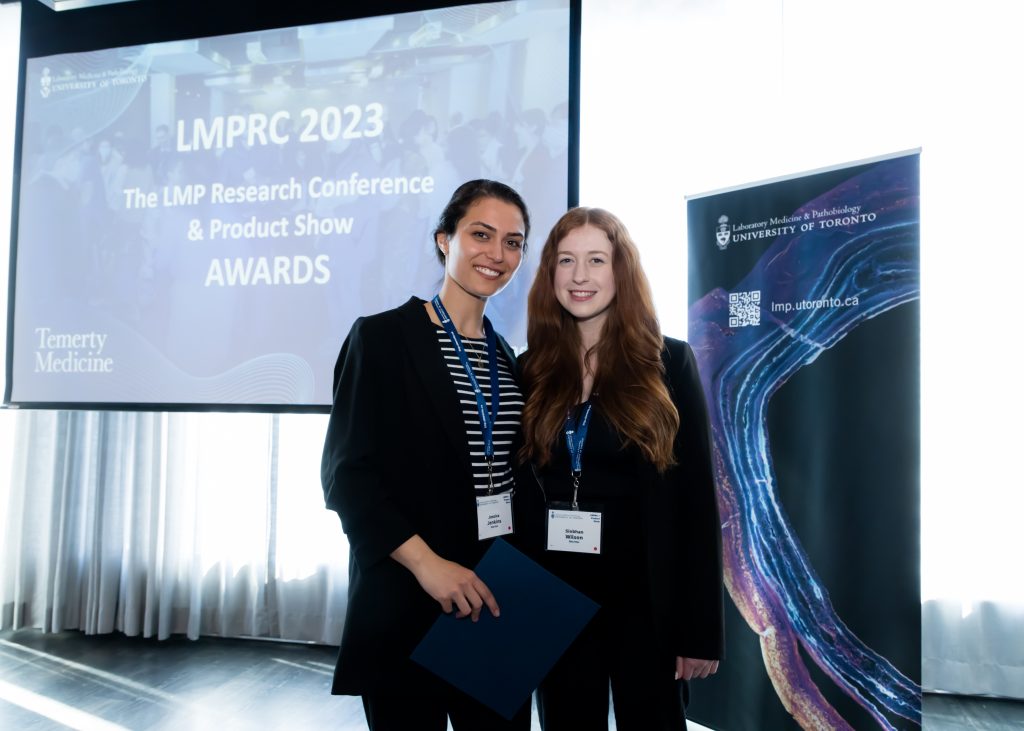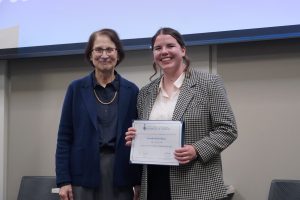
An award-winning student project dedicated to improving UTI diagnostic methods
Specifix Dx, created by TRP students Jessica Jenkins, Siobhan Wilson, and Jaspreet Randhawa has been winning prizes with their startup.
Even if a problem seems very obvious and simple, solutions are not always readily available. This is a challenge that the team behind Specifix Dx has consistently faced as they try to improve the accuracy of diagnostic tools for people at risk of mortality from Urinary Tract Infections (UTIs).
Specifix Dx is a startup created by Translational Research Program (TRP) students Jessica Jenkins, Siobhan Wilson, and Jaspreet Randhawa. Their aim is to improve clinical and at-home rapid testing of UTIs for people with Neurogenic Bladder, a condition that affects people who lack bladder control due to brain, spinal cord, or nerve problems. People with Neurogenic Bladder often experience recurrent UTIs and can’t always differentiate between UTI symptoms versus those from a cold or flu. Additionally, current at-home rapid tests often return false positives because they don’t account for urobiome differences that occur in individuals with Neurogenic Bladder.
“UTIs can actually be quite deadly, and there are not many reliable detection tools that work for every population,” notes Wilson.
“The deadly aspect of it is antibiotic resistance” adds Jenkins, “there’s a number of populations including people with spinal cord injury that are affected by antibiotic resistance and infections that lead to mortality. We’ve figured out that in part the reason why people develop antibiotic resistance is because of unnecessary antibiotic exposure which is exasperated by inadequate UTI detection tools”.
The inspiration for Specifix Dx began in a typical TRP fashion – by asking questions to people with lived experience.
“It started with my grandfather who passed away from a Urinary Tract Infection” reflects Siobhan Wilson. “UTIs present themselves so differently in different populations, so for a younger, able-bodied person it might present as burning with urination, but for older adults it can present itself as delirium, which is often mistaken for Alzheimer’s or Dementia. UTIs are very common so you would think they would be easily diagnosed, but there just aren’t tools that work reliably across these different populations.”
Not only did the team have to come up with something that addressed this healthcare gap, but they also needed to navigate healthcare as it intersects with the entrepreneurial and business world. Competing in and winning the Ideation Clinic’s 2022 Praxis Ideation Challenge helped them gain some of the skills needed to compete in the healthcare innovation world.
Our team was learning to navigate the world of health tech and developing skills like giving elevator pitches and preparing 5-minute slide decks
“Our team was learning to navigate the world of health tech and developing skills like giving elevator pitches and preparing 5-minute slide decks. It all came together when we finalized our idea and presented it during Demo Day, using the skills that we learned through the Ideation Challenge process.”
They took these skills to the University of Toronto’s Entrepreneurship Week from March 6th-9th of 2023. The culmination of this week was the Desjardins Startup Prize Pitch Competition, presenting $100K in prizes to competing startups. Prizes in two different categories were up for grabs: Early-Stage Category for startups that are in the beginning phases of development and growth and Later Stage Category for startups that are further along.
Students in the Translational Research Program competed in both categories and in the Early-Stage category, Specifix Dx won a 3rd place prize of $5,000.
But that’s not the only big win they’ve had. In May, the team competed at Medicine by Design’s Building a Biotech Venture Pitch Competition program hosted in partnership with H2i, Precision Medicine Initiative (PRiME), and Talk Boutique. The team won second place, taking home an award of $10,000 in funding.
Specifix Dx presented a poster at the Department of Laboratory Medicine and Pathobiology’s 2023 Research Conference where, yet again, they took home a prize; an award for the Best TRP Poster.
The Specifix Dx team is eager to continue pushing forward with their healthcare intervention:
“I plan to work on this project until we develop a tool that will detect UTIs reliably and facilitate earlier UTI treatment for people with neurogenic bladder. After graduation, I aspire to dedicate my career to addressing chronic health issues in resourceful and innovative ways,” says Jenkins.

Like this story?

Kate McDonald
Explore
- Room 120
- Old Administration Building
- University of Toronto
- 263 McCaul, Toronto, ON
- Canada, M5T 1W7
Copyright © 2024 — MHSc in Translational Research. All Rights Reserved




